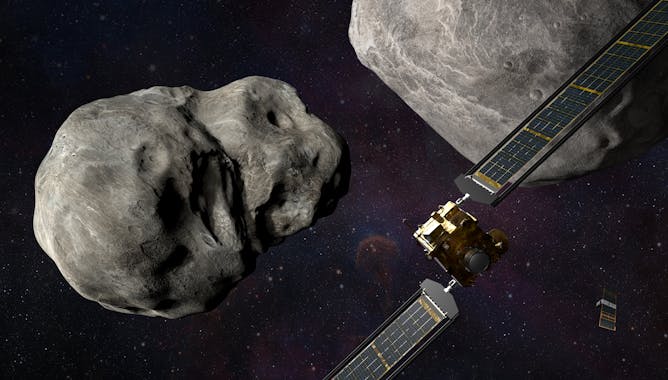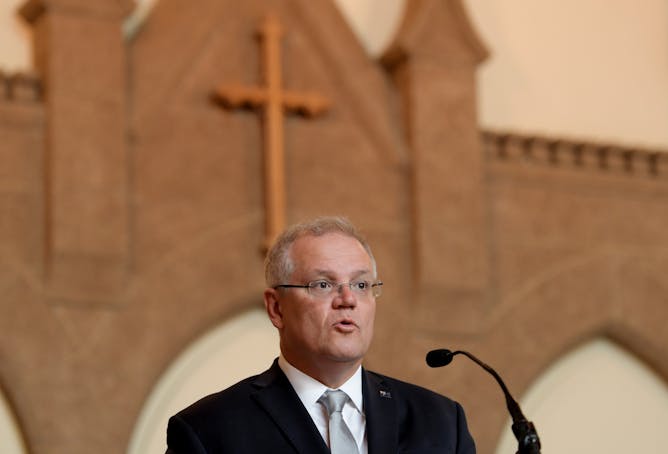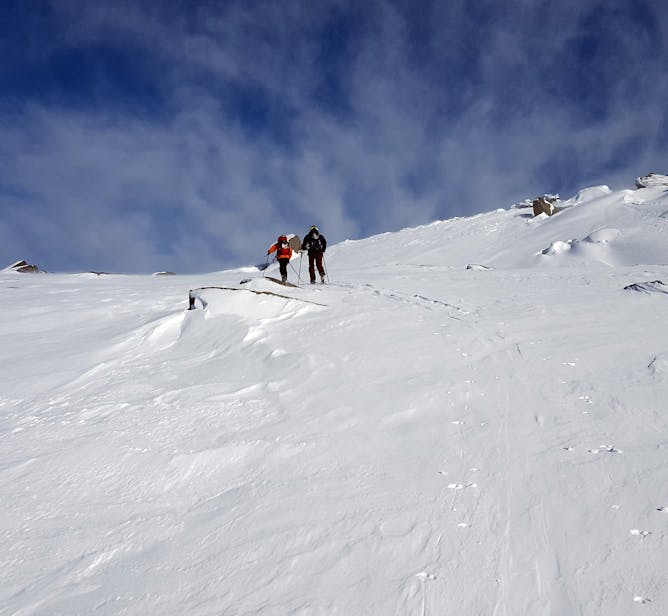|
|
|
|
We’re about to witness a world first – or, more accurately, an out-of-this-world first. In the coming hours, NASA’s DART mission will attempt to do something unprecedented: deliberately alter the course of a significantly sized body in our Solar System.
In simpler terms, the mission brief is to smash into an asteroid on purpose. And, as Steven Tingay explains, that feat would provide an important test of our ability to avert a planetary disaster by deflecting any future asteroids that end up heading towards Earth.
The target for this interplanetary trick shot is an asteroid called Dimorphos, 11 million kilometres from Earth. The DART probe will lock itself onto a collision course and then fly into the 160-metre-wide rock at 24,000km per hour. As if that weren’t clever enough, scientists will then check it worked by studying the effect on Dimorphos’s bigger sibling, Didymos.
Choosing a ‘binary system’ of asteroids that orbit one another gives astronomers a handy way to assess the result of the impact – if Didymos is successfully knocked off course, they should be able to detect changes in the sunlight reflected off the pair. Another reason for choosing these particular asteroids is precisely because they pose no danger to Earth. Remember, this is just a drill.
|

|
Michael Hopkin
Deputy Chief of Staff
|
|

Steven Tingay, Curtin University
The first ever planetary defence test is about to take place 11 million kilometres from Earth. All we can do is wait and see.
|

Isaac Gross, Monash University
How could a central bank even make a loss, when its job is printing money? The answer is that during the COVID crisis it turned traditional investment advice on its head – and here’s why.
|

Edwina Luck, Queensland University of Technology; Nicholas Grech, Queensland University of Technology
Optus used press releases, and Twitter when it could have contacted its customers by text.
|

Elenie Poulos, Macquarie University
Morrison’s religion and his government’s disastrous attempt to legislate a religious discrimination bill stirred up renewed public debate about the relationship between religion and politics.
|

Daniel X. Harris, RMIT University
Selective schools provide a ‘best of the best’ education in the public system, but can involve added stress for young people.
|

Pascal Scherrer, Southern Cross University; Isabelle Wolf, University of Wollongong; Jen Smart, University of Wollongong
You’re meant to carry out your poo, if you visit Australia’s alpine backcountry. But not many people do – and it’s leaving plenty of evidence.
|
Politics + Society
|
-
Daryl Adair, University of Technology Sydney
The AFL grand final is a celebration of a unique game, Australian made and owned, with a goal of competitive balance.
-
Rosemary Grey, University of Sydney; Rachel Killean, University of Sydney
Many Khmer Rouge leaders died before they could be indicted, and attempts to prosecute other suspects were blocked by the Cambodian government. Now, attention is turning to the tribunal’s legacy.
-
Michelle Grattan, University of Canberra
While Labor has the numbers in the lower house, it would need one additional vote beyond the Greens if the opposition opposed the legislation in the Senate.
-
Michelle Grattan, University of Canberra
University of Canberra Professorial Fellow Michelle Grattan and University of Canberra Vice-Chancellor Paddy Nixon discuss the week in politics.
-
Jarryd Bartle, RMIT University; Greg Stratton, RMIT University; Michele Ruyters, RMIT University; Monique Moffa, RMIT University
‘No body, no parole’ laws may at first appear to be in the public interest. But there’s a lack of evidence they work and a risk they may disproportionately penalise the wrongfully convicted.
-
Michelle Grattan, University of Canberra
“Hop in a taxi [in Kyiv] and the taxi driver is going to ask you, 'where are you from?' And you say you're Australian. Most likely he's going to say 'Bushmaster"
|
|
Health + Medicine
|
-
Nathan Bartlett, University of Newcastle
As the virus that causes COVID evolves, keeping up with it remains a challenge for variant-specific vaccines. The booster you can get now is the best one to get.
-
Alexandra Aiken, UNSW Sydney; Amy Peacock, UNSW Sydney; Philip Clare, University of Sydney; Wing See Yuen, UNSW Sydney
Should teens drink alcohol? Ideally, no. But in the real world, here are some tips on how to minimise harm.
-
Hassan Vally, Deakin University; Catherine Bennett, Deakin University
If someone who lives in a six-person household gets COVID, you’d expect, on average, two others to get it too.
|
|
Science + Technology
|
-
Vicki Huang, Deakin University; Cameron Patrick, The University of Melbourne; Sue Finch, The University of Melbourne
Although female inventorship has grown over the years, 15 years’ worth of patent outcomes from IP Australia suggests inventing is still a luxury for women.
-
Janice Crerar, Charles Darwin University
Earth has liquid rock inside. Here’s what happens to that rock to make lava happen.
|
|
Environment + Energy
|
-
Vanessa Pirotta, Macquarie University; Justine O'Brien, UNSW Sydney
The number of live animals seized by the Australian Government has tripled since 2017, with blue-tongue lizards and sulphur-crested cockatoos frequently captured.
-
Jade Fountain, University of Adelaide; Paul McDonald, University of New England
Our study found it wasn’t cafes with access to sugar-rich food that led to more miner aggression. In fact, gardens were where we recorded the highest amount of aggressive behaviour.
-
Soheil Mohseni, Te Herenga Waka — Victoria University of Wellington; Alan Brent, Te Herenga Waka — Victoria University of Wellington
A technique called ‘energy arbitrage’ allows owners of local ‘microgrids’ to make a profit by designing the network to buy cheap power, store it and sell it back at a higher price.
-
Alexander Cheesman, James Cook University; Amy Zanne, University of Miami; Lucas Cernusak, James Cook University
Termites are about to experience a significant global expansion in their prime habitat, thanks to climate change. Here’s what that means for deadwood.
-
Sam Rudd, University of South Australia; Drew Evans, University of South Australia
To maintain our role as a global food bowl, Australia has to keep innovating in agricultural technology.
|
|
Education
|
-
Emma Whatman, Deakin University; Paul Venzo, Deakin University
There is no such thing as “too young” to start the conversation about consent and children’s literature can help.
|
|
Arts + Culture
|
-
Joanna Mendelssohn, The University of Melbourne
The ‘Sydney Modern expansion’ seems a fitting description of a building that effectively doubles the size of the Art Gallery of New South Wales.
-
Carmen Jacques, Edith Cowan University
In my research into the Bali bombings and their aftermath, I have spoken to many people who were there or lost someone in the attack.
|
|
Books + Ideas
|
-
Debra Adelaide, University of Technology Sydney
Peggy Frew’s masterful control of Wildflowers, her fourth novel – about three sisters, once close, now estranged – promises not to engulf readers in the sorrow it must expose. Debra Adelaide reviews.
-
Meera Atkinson, University of Notre Dame Australia
After Anita Lane died, former collaborator Nick Cave said she “despised the concept of the muse but was everybody’s”. Meera Atkinson highlights her achievements – with help from those who knew her.
|
|
Business + Economy
|
-
Soheil Mohseni, Te Herenga Waka — Victoria University of Wellington; Alan Brent, Te Herenga Waka — Victoria University of Wellington
A technique called ‘energy arbitrage’ allows owners of local ‘microgrids’ to make a profit by designing the network to buy cheap power, store it and sell it back at a higher price.
-
Jenny Gordon, Australian National University
The first interim report of the Commission’s five-yearly productivity inquiry glosses over inequity.
|
|
| |
|
|
|
University of the Sunshine Coast
Moreton Bay, QLD, Australia
•
Full Time
|

|
|
|
|
| |
| |

|
| |
| |
| |
Featured Events, Courses & Podcasts
|
View all
|
|
7 October 2021 - 7 October 2026
•
|

|
25 November 2021 - 25 November 2024
•
|

|
22 - 24 November 2022
•
Acton
|

|
21 - 22 October 2022
•
Sydney
|

|
|
|
|
| |
| |
| |
| |
| |
|
|
|
|
|
|
|